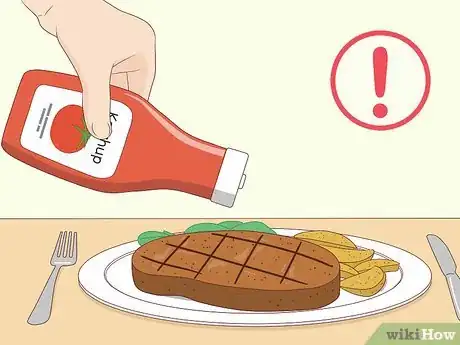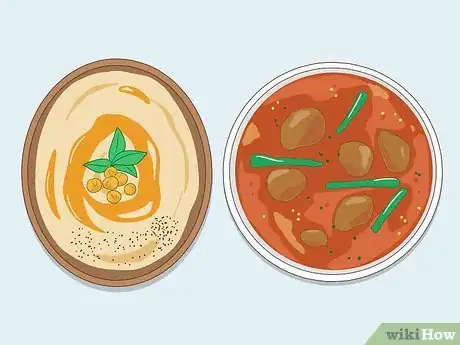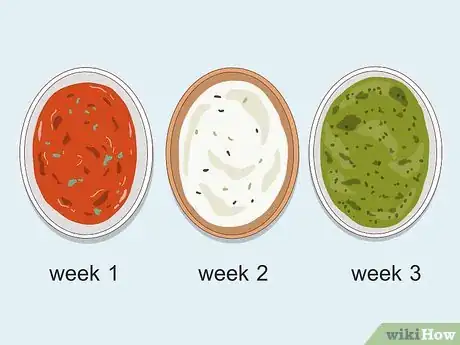This article was co-authored by Marrow Private Chefs. Marrow Private Chefs are based in Santa Rosa Beach, Florida. It is a chefs’ collaborative comprised of an ever-growing number of chefs and culinary professionals. Though regionally influenced primarily by coastal, traditional southern, cajun, and creole styles and flavors, the chefs at Marrow have a solid background in all types of cuisine with over 75 years of combined cooking experience.
There are 17 references cited in this article, which can be found at the bottom of the page.
This article has been viewed 80,516 times.
Whether you fancy yourself as a great cook or simply want to get more enjoyment out of your meals, you may want to develop sensitive taste buds. Beyond simply tasting the difference between bitter, salty and sweet, the ability to detect subtle flavors in the foods you prepare and enjoy is particularly useful. To make your taste buds more sensitive, you can look into correcting some of your eating habits and expanding your palate.
Steps
Correcting Detrimental Eating Habits
-
1Eat more slowly. Slow down and enjoy what you’re eating. It helps to treat this like an exercise: concentrate on your food as you chew, mentally thinking about its texture and flavor. Otherwise, you may be missing out on crucial stimulus and the more subtle flavors in your meals.[1]
-
2Focus on your meal. Unless you’ve always been a foodie, you might find that eating is a bit boring. Many of us have the TV playing in the background while we eat, or worse, eat at our desk during work. These distractions make your digestive system 30 to 40 percent less efficient when it’s time to break down food.You’re missing out on flavors you should be enjoying, and also making it more likely that your meal will cause gas, bloating and constipation.[2] Make sure you do the following when eating:
- No electronics. Keep the TV off and don’t eat at the computer.
- Get comfortable. Sit down at a table, and make sure you are comfortable as this will encourage you to take your time when you eat.
Advertisement -
3Ease up on the condiments. Don’t reach for the ketchup or BBQ sauce as soon as it’s time to eat. Over-complicating your meals by adding condiments robs you of the chance to savor a food’s texture and flavors. While an appropriate sauce can complement a food’s natural taste, you shouldn’t be slathering all your meals with condiments, as it desensitizes your taste buds.[3] [4]
-
4Avoid processed foods. Salt and sugar can overstimulate your taste buds when ingested in high enough quantities, leaving them desensitized to other flavors. Many processed foods, be they chips, cereal or ketchup, have an abundance of both these substances. Make an active effort to limit the presence of processed foods in your diet and your taste buds will start regaining their sensitivity. As you do this, keep the following in mind:
- While technically processed foods, meat and dairy products are processed for safety reasons. Don’t feel the need to avoid them.[5]
- Try to avoid foods that come bagged or boxed, such as cookies, chips or cereal.
- Avoid frozen foods, even frozen fruits and vegetables. They are less preferable than their fresh counterparts.
Expanding Your Palate
-
1Step outside of your comfort zone. Eating the same meals consistently can affect the way we taste. Get out of this rut and actively try to experience different foods. A great way to start this process is by seeking out renowned foods from different cultures. Whether it’s Indian Curry, Lebanese Humus or a Pad Thai, try to find restaurants that prepare genuine cultural specialties.[6] [7]
-
2
-
3Try different spices. Don’t go slathering all your meals in hot sauce. Even if you might not be a master chef, you should consider expanding the contents of your spice rack, which will liven up your meals tremendously. A great start is with a classic marinara sauce. You can add oregano one week, swapping it for thyme or basil in the following weeks. Once you understand how different spices affect your meals, you can branch out and perform the same experiment with different foods.[13]
-
4Improve your sense of smell. Your sense of smell plays a vital role in how you taste different foods. As you eat, chemicals are released that reach olfactory receptors in your nose, which combine with your tastebuds to create the flavors you know.[14] Here are a few ways to improve your sense of smell:
-
5Stop smoking. Long-term smoking can damage the nerves that detect smells.[17] Do this gradually, and ask your doctor for recommendations on how to quit smoking.
-
6Attend tasting events. Wine and cheese tasting are the most common, as they are known for having strong tastes with subtle differences. For instance, you might be able to tell the difference between a Cabernet Sauvignon and a Pinot Noir, but might not be able to describe each flavor accurately. Attending these types of events exposes you to people with refined palates, which will let you learn the language used when describing flavors, as well as letting you experience them for yourself. You can find these events through a quick online search through directories such as Local Wine Events.
Expert Q&A
-
QuestionHow can I boost my taste buds?
 Marrow Private ChefsMarrow Private Chefs are based in Santa Rosa Beach, Florida. It is a chefs’ collaborative comprised of an ever-growing number of chefs and culinary professionals. Though regionally influenced primarily by coastal, traditional southern, cajun, and creole styles and flavors, the chefs at Marrow have a solid background in all types of cuisine with over 75 years of combined cooking experience.
Marrow Private ChefsMarrow Private Chefs are based in Santa Rosa Beach, Florida. It is a chefs’ collaborative comprised of an ever-growing number of chefs and culinary professionals. Though regionally influenced primarily by coastal, traditional southern, cajun, and creole styles and flavors, the chefs at Marrow have a solid background in all types of cuisine with over 75 years of combined cooking experience.
Private Chefs You can use certain acids like lemon juice or rice vinegar (in very small amounts) to enhance your taste sensations. Staying well-hydrated can also be a big help.
You can use certain acids like lemon juice or rice vinegar (in very small amounts) to enhance your taste sensations. Staying well-hydrated can also be a big help.
Warning
- Many prescription medications have a negative impact on your ability to taste different foods. Try talking to your doctor about lowering your dose or finding alternate medication. Otherwise, look into different spices and stronger tasting foods to liven up your meals.[18]
References
- ↑ https://www.coeurdexocolat.com/develop-your-sense-of-taste
- ↑ http://recipes.howstuffworks.com/top-5-improve-palate1.htm
- ↑ https://economictimes.indiatimes.com/magazines/panache/between-the-lines/hooked-to-sugar-time-to-rehabilitate-your-taste-buds/articleshow/57181401.cms?from=mdr
- ↑ https://www.chefsbest.com/5-habits-affect-sense-taste/#
- ↑ http://www.nhs.uk/Livewell/Goodfood/Pages/what-are-processed-foods.aspx
- ↑ https://www.helpguide.org/articles/healthy-eating/eating-well-as-you-age.htm
- ↑ http://recipes.howstuffworks.com/top-5-improve-palate5.htm
- ↑ https://timesofindia.indiatimes.com/life-style/health-fitness/health-news/why-do-sweet-things-stop-tasting-so-after-we-eat-anything-sugary/articleshow/56982337.cms
- ↑ https://onlinelibrary.wiley.com/doi/abs/10.1111/j.1745-459X.2008.00170.x
- ↑ https://etd.ohiolink.edu/apexprod/rws_etd/send_file/send?accession=osu1203639629&disposition=inline
- ↑ http://www.tastespotting.com/tag/palate+cleanser
- ↑ https://www.indiatimes.com/health/healthyliving/foods-that-cleanse-your-palate-237510.html
- ↑ https://www.coeurdexocolat.com/develop-your-sense-of-taste
- ↑ https://www.brainfacts.org/thinking-sensing-and-behaving/taste/2012/taste-and-smell
- ↑ https://losangelesentdoctor.com/can-you-improve-your-sense-of-smell/
- ↑ http://www.rd.com/health/wellness/sharpen-your-sense-of-smell-and-taste/
- ↑ https://pubmed.ncbi.nlm.nih.gov/18085020/
- ↑ https://www.ncbi.nlm.nih.gov/pmc/articles/PMC6051304/
































































